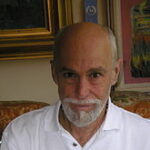The Secular Buddhist Podcast
Episode 307 :: Eve Ekman :: Cultivating Emotional Balance
Eve Ekman Eve Ekman joins us to speak about the program Cultivating Emotional Balance. In quite a few conversations lately, I’ve noticed a trend to encourage the perspective of emotions as transitory. Which has merit, of course thoughts, sensations, and emotions arise and fade. But I’ve seen this attitude sometimes cross over into dismissing both…
Read MoreEpisode 306 :: Cameron Conaway :: Unplugged — Emotional Trauma, Anger, and Transformation
Cameron Conaway Cameron Conaway joins us to speak about how Buddhist practice has helped the healing process of childhood trauma. If you have a history of childhood trauma of some kind, know that in today’s episode we explore this topic from the inside. Our guest openly discusses the pain he’s endured, how it influenced his…
Read MoreEpisode 305 :: Ann Gleig :: American Dharma: Buddhism Beyond Modernity
Ann Gleig Ann Gleig joins us to speak about her new book, American Dharma: Buddhism Beyond Modernity. It was just a few years ago that secular Buddhism was an unknown term, and in many contemporary Buddhist circles, unwelcome. Though there are still those who have difficulty with it, the fact is secular Buddhism has attained…
Read MoreEpisode 304 :: Jay Forrest :: Spirituality Without God: An Introduction to Bodhidaoism
Jay Forrest Jay Forrest joins us to speak about a contemporary fusion of Buddhism with Daoism from his book, Spirituality Without God: An Introduction to Bodhidaoism. One of the many aspects of Buddhism I find fascinating is how it connects with and even complements other world views. I expect much of that is rooted in…
Read MoreEpisode 303 :: Bernat Font :: Secular Mindfulness and Buddhism
Our friend Bernat Font returns to the podcast to speak about Stream Entry as practice, and the evolution of secular mindfulness and Buddhism. As many of you know, Buddhism is not a monolithic religion with no variation. There are lots of different branches, each with their own further unique interpretations, rituals, and ways the sasana…
Read MoreEpisode 302 :: Daniel Cozort :: Oxford Handbook of Buddhist Ethics
Daniel Cozort Dan Cozort joins us to speak about the Oxford Handbook of Buddhist Ethics. One of the richest aspects of the study of Buddhism is how its ethical framework resonates or may be a bit discordant with a particular time and place. Far from being a dusty retrospective of what was, Buddhist ethics has…
Read MoreEpisode 301 :: Michael Jerryson :: If You Meet the Buddha on the Road: Buddhism, Politics, and Violence
Michael Jerryson joins us to speak about his book If You Meet the Buddha on the Road: Buddhism, Politics, and Violence. Last episode of this podcast we saw how Buddhism helped one man change his worldview to one of compassion and care for his fellow human beings. And, as Buddhists, this can be reassuring about…
Read MoreEpisode 300 :: Arno Michaelis and Pardeep Singh Kaleka :: The Gift of Our Wounds
Dhammapada Verse 5 Kalayakkhini Vatthu Na hi verena verani sammantidha kudacanam averena ca sammanti esa dhammo sanantano. Hatred never ends through hatred. By non-hatred alone does it end. This is an ancient truth. The Dhammapada: Teachings of the Buddha translated from the Pali by Gil Fronsdal 2008 Thank you for joining us for this landmark…
Read MoreEpisode 299 :: Gary Gach :: Pause Breathe Smile: Awakening Mindfulness When Meditation Is Not Enough
Gary Gach Gary Gach returns to the podcast to speak about his new book Pause Breathe Smile: Awakening Mindfulness When Meditation Is Not Enough. Meditation is sometimes thought of as a passive relaxation technique. And I’ll admit, those three words together rub me the wrong way. Meditation is, to me, an active, alive way of…
Read MoreEpisode 298 :: Sara Rahmani :: Understanding Unbelief: Mindfulness Meditation Project
Sara Rahmani Dr. Sara Rahmani speaks with us about her work Understanding Unbelief: Mindfulness Meditation project. What is it like to be faced with adopting a religious belief system that’s not part of your personal background? Or perhaps it is, and once there, you find an increasing cognitive dissonance with what’s overtly or subtley encouraged…
Read More








